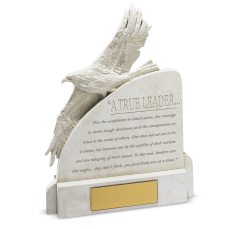Types of Employee Awards: Build Company Culture and Boost Morale
Recognizing and appreciating employees is more crucial than ever. But first, you must understand the types of awards and how they work. It's not just about giving a plaque or a certificate; it's about building a culture that values each individual's unique contributions. In this comprehensive guide, we'll explore various types of employee awards that go beyond the traditional, diving into modern methods that resonate with today's workforce. employee appreciation gifts boost morale, but there are so many more ways to recognize your employee's contributions to the company's success.
Time Off as an Award
Why Time Off Matters
Time off is often overlooked as a form of employee recognition, yet it's among the most valued. Giving employees extra time to relax and recharge can significantly impact their well-being and, in turn, their productivity.
How to Implement
Consider offering "Mental Health Days" or "Flex Fridays" as part of your employee recognition programs. These initiatives show that you care about your employees' well-being and contribute to a healthier work-life balance.
Monetary Rewards
The Double-Edged Sword of Cash Incentives
While the allure of cash bonuses and financial incentives is undeniable, it's essential to recognize that money isn't the ultimate solution for increasing engagement or morale. More money often comes with more responsibilities, potentially adding to an employee's stress levels.
Why Monetary Rewards Aren't Ideal
Cash incentives can sometimes send the wrong message. They may imply that the work is transactional, reducing recognition's emotional and psychological aspects. We earn money for our labor and skills; it's not necessarily a measure of our value or contributions to the team. Therefore, while it may provide a temporary boost, it doesn't foster long-term engagement or job satisfaction.
Alternatives to Monetary Rewards
If you want to move away from cash incentives, consider other forms of recognition that can have a more lasting impact. For example, offering professional development opportunities or mentorship programs can be more meaningful as they invest in the employee's future and personal growth.
Certificates and Plaques
The Classic Approach
Certificates and plaques are the traditional go-to for employee awards. They offer a tangible reminder of achievement and are easy to implement.
Modernizing the Classics
Consider offering digital badges that employees can display on their LinkedIn profiles or within an internal company network in the digital age. This modern twist can make the recognition more public and shareable.
Trophies and Physical Awards
The Tangible Impact
Trophies and other physical awards offer something that digital rewards can't. A physical rewards like crystal awards that serves as a lasting reminder of achievement.
Customization is Key
Custom trophies aligning with company culture or specific achievements can make the award more meaningful. For instance, a "Culture Champion" trophy could be awarded to an employee who significantly contributes to a positive work environment.
Psychological Aspects of Employee Recognition
The Science Behind Recognition
Recognition isn't just a nice-to-have; it's a psychological need. Studies show that employees who feel recognized are more engaged, productive, and less likely to leave their jobs.
Tailoring Recognition to Individual Needs
Not all employees are motivated by the same types of recognition. Some may value public praise, while others prefer a quiet thank-you note. Understanding these nuances and what words of recognition to use can make your recognition efforts more effective.
Best Practices for Employee Awards
Frequency and Timing
Be timely when recognizing service milestones and other occasions. Real-time recognition can have a more immediate impact with your employees.
Align with Company Values
Your awards program should reflect the values and culture of your organization. This alignment reinforces key behaviors and contributes to a cohesive company culture.
Wrapping Up: The Essence of Meaningful Employee Recognition
Employee recognition programs are crucial in creating a positive and productive work environment. The power of recognizing employees' hard work and dedication cannot be underestimated. It boosts morale and motivates individuals to perform at their best. The recognition program can take various forms, such as employee awards, rewards, or simple appreciation gestures.
By implementing an effective employee recognition programs recognition, companies can show their appreciation for their employees and create a sense of value among the workforce. Employees who feel recognized and valued are more likely to be engaged and satisfied with their work.
One way to create an effective employee recognition program involves involving the employees. Encouraging employees to share their ideas and suggestions can help create a program tailored to their needs and preferences. This involvement can also foster an employee's sense of ownership and pride.
Recognizing employees can take many forms, including employee gifts, cards, or public commendations. The key is to make the recognition meaningful and aligned with the company's values and culture. When employees feel that their efforts are being acknowledged and appreciated, they are more likely to feel motivated and continue to perform at their best.
Employee recognition programs should also extend beyond individual achievements and include team recognition. Recognizing and appreciating teamwork helps foster collaboration and a sense of unity among employees. It creates a culture where individuals feel valued for their contributions to the team's overall success.
In conclusion, an effective employee recognition program is essential for creating a positive work environment and motivating employees. By recognizing employees' hard work, dedication, and achievements, companies can harness the benefits from employee awards and foster a culture of appreciation that creates a team that strives for excellence. So, let's recognize and appreciate our employees to build an engaged and productive team.

































